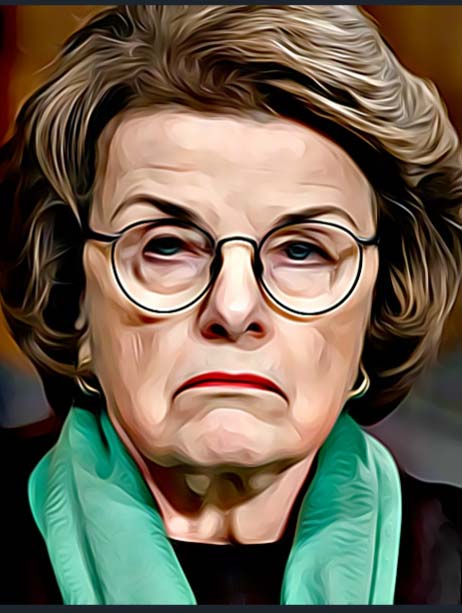 Can the former Bruce Jenner, Olympic marathoner, run against Dem Dianne Feinstein (above) and win (political) 'gold'?
Can the former Bruce Jenner, Olympic marathoner, run against Dem Dianne Feinstein (above) and win (political) 'gold'?
In this weekend's political news of the odd, we have this report of Caitlyn Jenner pondering a U.S. Senate run - presumably a challenge to Democrat Dianne Feinstein, who's up for re-election next year.
"I have considered it. I like the political side of it," Jenner told a radio interviewer. "The political side of it has always been very intriguing to me."
"Can I do a better job from the outside? Kind of working the perimeter of the political scene, being open to, you know, talk to anybody? Or are you better off from the inside, and we are in the process of determining that," she said. "And yeah, but I would look for a senatorial run."
The former Olympic decathlete and Kardashian patriarch, who famously transitioned (the sex change prompted both a memoir and a short-lived show on E!), set a six-month deadline for reaching a decision.
Let's assume that Jenner, should she give it a go, would do so as a Republican. She's a supporter of past GOP candidates. In 2016, Jenner offered to be Texas Sen. Ted Cruz's "trans ambassador" (she felt Cruz struggled most among the Republican presidential hopefuls on LGBT issues, so she volunteered the help). And she voted for Donald Trump instead of Hillary Clinton.
There would be the matter of some messy personal business to attend to, such as the car wreck in Malibu that left a 70-year-old woman dead (Jenner wasn't charged with a crime).
And some voters still might take issue with Jenner receiving an ESPY Arthur Ashe Courage Award (some critics thought it had more to do with ESPN ginning up viewership than it was a testament to Jenner's personal endurance).
But maybe the greatest concern of all: a Jenner Senate run tossed into the cultural bacteria frappe that is the Kardashian clan and its universe of unabashed self-promotion.
To wit, these story lines coming your way on reality television: which of the Kardashian and Jenner offspring would support her? And what about ex-wife Kris, once outed by daughter Kim as a Republican?
It's tiring - and depressing - just to think about it.
Should Jenner run, she could easily end up as more of a shallow sideshow than a deep thinker (the 2003 gubernatorial recall election, with the likes of child actor Gary Coleman and porn actress Mary Carey, comes to mind).
The winner in that scenario: the candidate and her family, if it leads to another television show or some other way to monetize the moment. But it certainly doesn't favor California voters and their concerns over the state's future.
In the meantime, there's a different kind of transitioning underway in Golden State politics: a generational turnover.
Earlier this year, Kamala Harris replaced Barbara Boxer as California's junior senator. The age difference: 24 years.
Lt. Gov. Gavin Newsom is the early frontrunner to replace Jerry Brown as California's chief executive (Brown, the nation's oldest governor, is term-limited). The age difference: 29 years.
And should Feinstein, at age 84 the eldest of the nation's 100 U.S. senators, decide not seek reelection next year? For argument's sake, let's award the job to Los Angeles Mayor Eric Garcetti. The age difference: 38 years.
This is how politics is supposed to work - the nation and the states engaging in generational turnovers. It's happened nationally three times in the last six decades: 1960 (JFK 27 years younger than Ike); 1992 (Bill Clinton 22 years younger than George H.W. Bush); and 2008 (Barack Obama 15 years younger than George W. Bush).
However, 2016 was an exception to the rule: Donald Trump turned the clock back 15 years (The Donald being a 1946 baby, as are Clinton and the Bush 43). So too would have Hillary Clinton, born in 1947.
California likewise has avoided a dip in the political fountain of youth.
Brown was elected governor in 2010, despite a brief primary challenge by Newsom. Had Newsom instead been the Democratic nominee, he'd have been all of 43 at the time of his election - a gain of 20 years from Arnold Schwarzenegger, who's nine years younger than Brown.
But that didn't happen. California opted for an older candidate who, despite his ardor for combatting climate change, is not as progressive as his party's noisiest activists. While Newsom champions legalized marijuana and universal healthcare, Brown's not wild about either concept (an attempt to bring a single-payer healthcare bill to the governor's desk stalled in the Legislature last month).
What this portends for California, in the near future, is a string of Democratic candidates looking not just to replace Brown and maybe Feinstein but presumably tilting the state further to the left.
Caitlyn Jenner may or may not be a Democrat. Overall, we don't know where she exists on the left-right political spectrum. But what she does represent is a distraction.
It's hard enough keeping up with all that ails California.
Why an excuse to keep the Kardashians relevant?
Comment by clicking here.
Bill Whalen is a research fellow at the Hoover Institution, where he studies and writes on current events and political trends. In citing Whalen as one of its "top-ten" political reporters, The 1992 Media Guide said of his work: "The New York Times could trade six of its political writers for Whalen and still get a bargain." During those years, Whalen also appeared frequently on C-SPAN, National Public Radio, and CNBC.


 Contact The Editor
Contact The Editor
 Articles By This Author
Articles By This Author